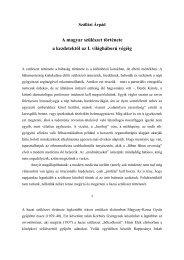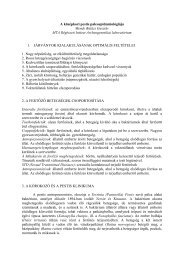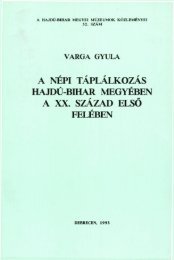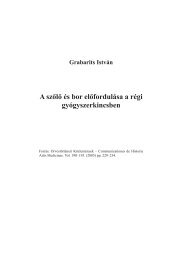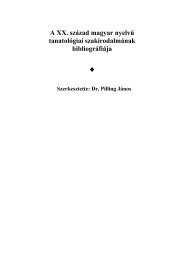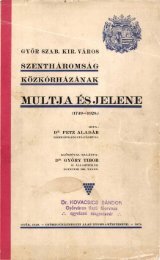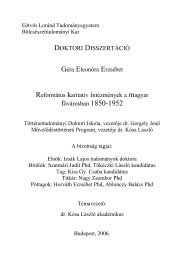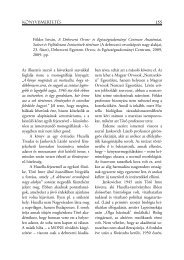Szállási Ãrpád
Szállási Ãrpád
Szállási Ãrpád
You also want an ePaper? Increase the reach of your titles
YUMPU automatically turns print PDFs into web optimized ePapers that Google loves.
Summary<br />
Debrecen in playing an important role in Hungárián education since the establishment of the<br />
Reformed College in 1538. After three years, the capital Buda, has been occupied by the<br />
Turks, which lasted up to 1686. During this time, Debrecen located at the bordér between<br />
territories occupied by the Turks and the semi-independent Transilvania, had a peculiar<br />
situation. It has suffered a lot because of big power politics. The conversion to Calvinist type<br />
Protestantism in 1551 was decisive, therefore the City, beyond its relation with the neigh<br />
bouring Transilvanian Principe's has maintained close relationship mainly with Swiss<br />
(Zürich, Basel) and Dutch (Utrecht, Leyden) universities. Somé of famous professors írom<br />
Debrecen graduates in these places. These was alsó the source of rational Decartes spirit,<br />
Carteniasm, has been brought to Calvinist Debrecen. The importance of the City has grown<br />
when it succeeded to obtain "free royal city" status from the Catholic Habsburgs, in 1693.<br />
Obviously, the situation of the College was always in dependence on the city budget. It was<br />
not accidental, that after obtaining the status of free royal city, the second half of the 18th<br />
century became the golden age of education in Debrecen. This alsó had a decisive impact<br />
upon the whole of Hungárián spiritual life, demonstrated by big names liké György Maróthi<br />
(1715-1744) a mathematician who reorganised musical culture in the college, István Hatvani<br />
(1718 - 1786), who beside teaching mathematics, experimentál physics, phylosophy<br />
astronomy, has alsó practised liké a medical doctor and bear the name "Hungárián Faust"<br />
because of his diabolic fame.<br />
Natural sciences in the city have been developed mainly by physicians. Beside the already<br />
mentioned István Hatvani, the excellent botanical biologist József Csapó (1734 - 1799) was<br />
another one, who is alsó the author of the first Hungárián publication in Pediatry. Another<br />
one was one of the decisive personalities in Hungárián medical history, István Weszprémi<br />
(1723 - 1799), who has travelled to England, too. In England he has written his small work<br />
entitled "Tentamen de inoculanda pesté" (London, 1755), in which among others he has<br />
suggested the idea of protective vaccines against plague. At the same time he has passed his<br />
examination in obstetrics at the well renowned professor Smellie, and after he returned home<br />
he has edited the first Hungárián book in midwifery (Debrecen, 1766).<br />
In parallel with the golden age of Debrecen spirituality, the University in Nagyszombat<br />
(Tyrnavia) founded earlier archbishop Péter Pázmány got a Faculty of Medicine and later, in<br />
1777 it has been moved to the capital of the country Buda-Pest where at the beginning of the<br />
19th century big developments have been started in all flelds. Therefore, colleges in the<br />
country lost there importance, which does not mean that their staff did not contained<br />
professors well-known in the country. As an example can be given József Török, who<br />
because of his Calvinist religion could not became a medical professor in the capital. He<br />
moved in 1848 to Debrecen where he taught natural sciences and worked as college physician.<br />
His national fame has been established by his work in balneology, but he alsó wrote quite<br />
good humán physiology handbook, too.<br />
Based ontó his work in natural sciences, he has been elected as member of the Hungárián<br />
Academy of Sciences, therefore we acknowledge in his person the Debrecen physician<br />
member of the Academy in the 19th century.<br />
130


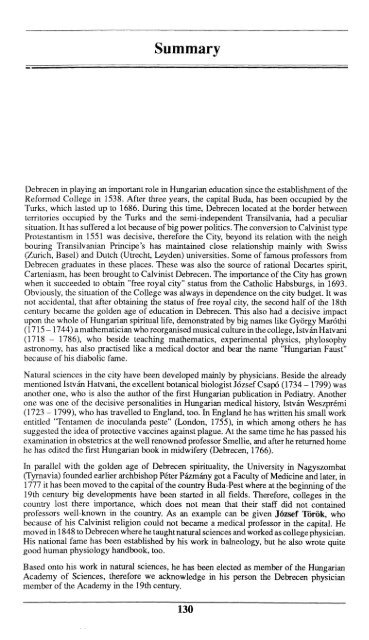

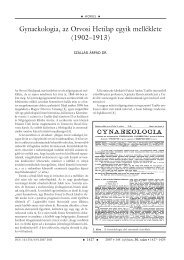
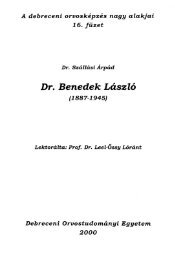
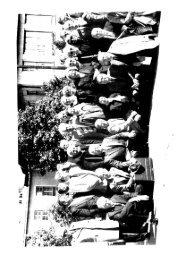
![vor zweihundert ]ahren war das generale normativum in re sanitatis ...](https://img.yumpu.com/25057177/1/171x260/vor-zweihundert-ahren-war-das-generale-normativum-in-re-sanitatis-.jpg?quality=85)
